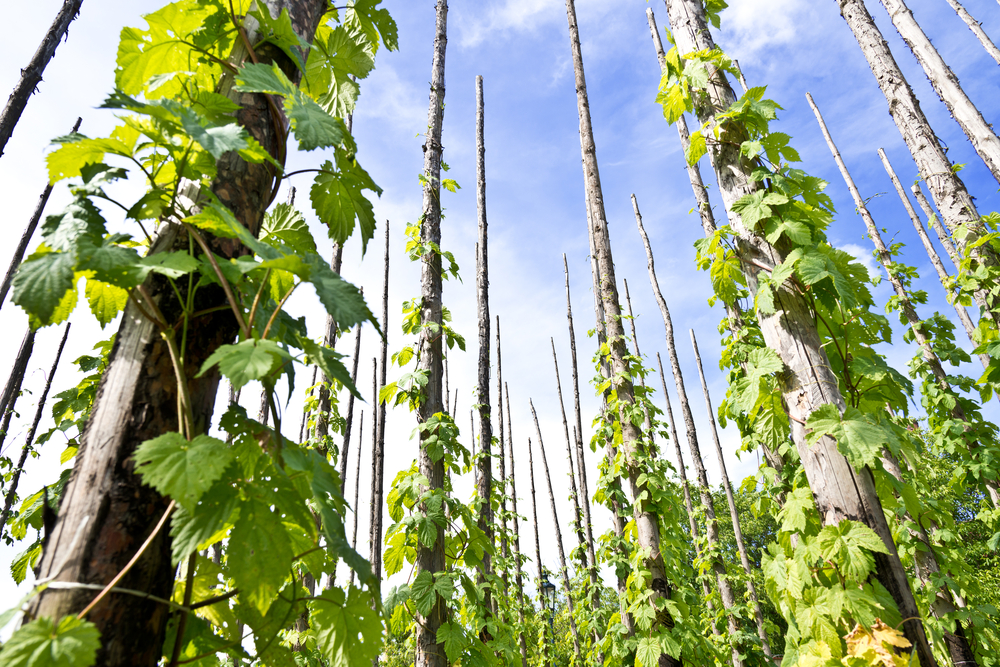Isinglass River Hops Exchange Spurring On the Local Hop Market

“Traditional hop garden in Zatec Town” by Shutterstock
Over the last decade, local agriculture and craft beer have seen tremendous growth despite the ongoing economic instability. Unfortunately, the farmers growing hops and barley haven’t been able to keep up with demand, causing the price of raw materials to skyrocket. Brewers are now being forced to purchase Pacific Northwest hops nearly five years in advance due to shortages. This is why Jameson Small created the Isinglass River Hops Exchange, which is encouraging New England farmers to convert hay and less profitable commodity crops into hop fields.
Small has created an Indiegogo crowd funding campaign to raise $30,000 for a custom-built pelletizer machine, harvesting and drying equipment, and capital toward the conversion of farmland. When they launch this fall, Isinglass River Hops Exchange will be the first hop processing and distribution company in New England, working hand in hand with plant specialists, extension agents, farmers, and brewers.
“Currently there’s about 25,000 pounds of hops per year that are being produced in New England, and farmers aren’t unable to get them to market in the form brewers need them to be,” Small says. “Recently a market feasibility study came out that said 83 percent of brewers require hops to be pelletized. That’s the industry standard. Since I started this project a year ago, I’ve had dozens of meetings with farmers who are interested in converting their fields to hops, but their main concern is how to get it to the brewers. So the largest part of the crowd fund campaign is to raise funds for a particular type of pelletizing machine. It makes no sense for everyone to buy a $50,000 machine when we can all share one.”
To aid in the $80,000 startup cost, Small is entertaining the idea of outside investors. He’s also entered into the New Hampshire Startup Challenge where he’s one of four finalists being considered for the $55,000 cash prize. Regardless of what happens in the Indiegogo campaign (which ends on July 11), or in the startup challenge, Small is confident he’ll be able to process the increasing amount of New England and New York hops that will start being harvested in late August.
“Currently there’s only two farms—Four Star Farm and The Hop Yard—that produce over 10 acres of hops in New England,” Small says. “Most farmers only have an acre or two, so they don’t have the volume that a brewer needs for year-round production. By combining varieties and putting them through the pelletizer, we would have a consistent product that New England breweries could use all year. This would be the only pelletizer in the Northeast, particularly of this quality. So we could also help out New York, and their 250 acres, with some of their processing.”
Several breweries have already reached out to Small about purchasing local hops from Isinglass River Hops Exchange including Tuckerman, Tributary Brewing, Earth Eagle, and Smuttynose, who will be using whole and pellet varieties in their annual wet-hop beer, Herbaceous.
“Before I started putting money into this niche market, I started to talk with breweries in New Hampshire and the rest of New England to gauge everyone’s interest,” Small says. “As of now, I’ve talked to 15 different brewers and I have yet to find one that wasn’t interested. There are so many breweries these days, they’re all looking for ways to differentiate themselves from the competition. Hops from New England taste different than anywhere else in the world. Local brewers want to utilize local products and they want to showcase the terroir of the Northeast. I think this is exciting because it opens up a whole new sector of craft beer.”


